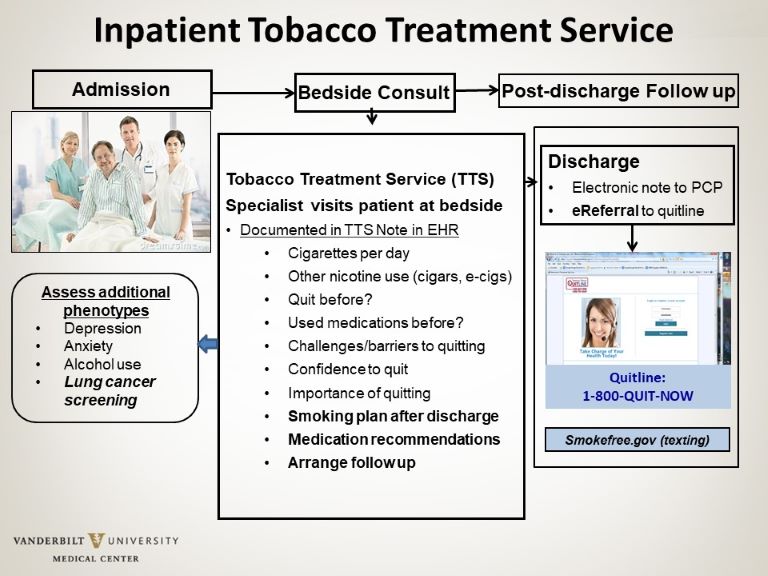
Clinical and Quality Improvement:
ViTAL clinical and QI initiatives include the Tobacco Treatment Service (TTS), a clinical inpatient service staffed by Certified Tobacco Treatment Specialists (CTTS) that provide evidence-based care to tobacco users who are hospitalized. Founded by Dr. Tindle in 2015, the TTS provide opt-out care (i.e., direct consult is not required), which is becoming the accepted standard for tobacco treatment in clinical settings. The TTS assess and proactively visit patients identified from the Electronic Health Record (EHR) as current or former smokers (those who have quit within the past month and are at high risk of relapse). The CTTS assess patients’ tobacco use patterns, offer counseling, and recommend smoking cessation medications to manage nicotine withdrawal and promote long-term cessation. To achieve better long-term continuity of care, the TTS will utilize bi-directional electronic referral (“e-Referral”) to the TN state quitline. This project is modeled on a prototype led by Dr. Tindle during her tenure at the University of Pittsburgh Medical Center and has been adopted by the North American Quitline Consortium (NAQC) for the continent. All hospitalized smokers seen by the TTS are offered eReferral, and those who accept are contacted by the state quitline’s tobacco treatment specialists within 2 days of hospital discharge.
Tobacco Treatment Service (TTS):
The TTS is comprised of Certified Tobacco Treatment Specialists (CTTS) who contact, patients who are documented as using tobacco products or e-cigarettes in the inpatient setting. In addition to helping collect data for the ViTAL Center's research team, the CTTS perform clinical smoking cessation counseling services. Specifically, the CTTS document a variety of smoking-related health and demographic information. They educate patients about the dangers of smoking, the benefits of quitting smoking, and existing resources that are available to help people quit. They assist patients with the quitting process by helping manage withdrawal symptoms, cravings, and medication prescription and use. At discharge, the CTTS helps arrange for continuing medication and counseling as patients transition out of the hospital.
eReferral:
In 2012, the North American Quitline Consortium (NAQC) established a workgroup to help guide efforts to establish electronic referral (eReferral) systems between tobacco quitlines and healthcare providers. Referral systems are one of three interventions deemed effective at increasing use of quitlines, increasing both the use of quitline services and the number of patients who successfully quit using tobacco. The implementation of eReferral services have helped enable easy, effective, bi-directional communication between quitlines and EHRs of healthcare providers. Members of the workgroup include interdisciplinary representatives from clinics, hospitals, physician groups, quitline and service providers, state health departments, and universities. The ViTAL Center's director, Dr. Hilary Tindle, was closely involved with the implementation of eReferral systems in Pennsylvania, as well as eReferral projects in Tennessee and Mississippi.
Regulatory Initiatives:
In its fiscal year 2015 final rule, the Centers for Medicare & Medicaid Services (CMS) required reporting of tobacco treatment quality measures as part of the Inpatient Psychiatric Facilities Prospective Payment System (IPF PPS) and began implementing financial penalties for inadequate performance on these measures. Dr. Hilary Tindle and the ViTAL Center have worked closely with the Vanderbilt Psychiatric Hospital (VPH) to adapt the tobacco fields to be more conducive to the reporting requirements. We have also worked with nurse educators to ensure that VPH staff was properly trained in the new CMS requirements and how to use the EHR fields. Additionally, in preparation for these measures the ViTAL Center has proactively taken steps to ensure appropriate staff training and that similar changes to the EHR are implemented at Vanderbilt's primary medical hospital.
